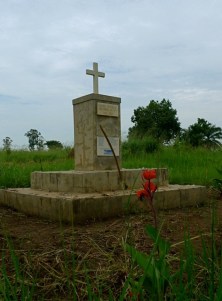When the ICC Comes to Lukodi
Written July 12, first published at Africa Portal on Aug 1, 2012.
LUKODI, UGANDA — An important visitor is coming to Lukodi, a village in the north of Uganda. To prepare, a man with a limp and a withered hand sweeps the fallen leaves and red dust off the ground under several mango trees. He arranges five white plastic chairs and two wooden benches. Shortly after noon an elderly gentleman arrives pushing a bicycle with no pedals. He and I chat while other community members begin to arrive. I ask the man what he wants to hear from the coming visitor, an outreach officer for the International Criminal Court (ICC).
“I want him to say that he will arrest Kony and bring him to book,” says the man, speaking in Luo to my translator and me. “And he should tell us how to address the problems that victims continue to face.”
The visit from the ICC representative allows me to observe how the Court portrays itself to a conflict-affected community. The following day I will ask my focus groups what they think of the presentation.
I suspect that the ICC representative has chosen Lukodi for the same reason I have — it is a community known for the massacre it suffered in May 2004. The elderly man tells me of the day Lukodi was attacked by a detachment of Joseph Kony’s Lords Resistance Army (LRA). He ran into the bush and escaped as the rebels abducted, burned and killed fellow residents. That night his wife searched for their daughter-in-law, who had a newborn child. The daughter-in-law was abducted by rebels, while the baby was left behind and trampled, and later died.
According to an investigation by the Justice and Reconciliation Project, the Ugandan organization I am partnered with, about 60 people were killed in that attack. Lukodi’s residents fled the area and most were displaced from their homes for more than three years, often living in squalid and unsafe camps. The mass killing and displacement capped two decades of civil war in the area, and often-brutal treatment by both rebels and government troops.
As we talk, more people arrive. The gathering today is festive. There will be dancing for the visitor: two drums are laid on the ground beside a set of calabashes, dried gourds that will be played with metal brushes. Women dancers walk about shaking the hands of friends, accompanied by the chiming of metal bangles on their ankles.
A young man tells me that many people have walked a long way to attend the meeting. “We make some sacrifice to come today because during the conflict we couldn’t come together as a community,” he says. “We would keep silent about what happened. Now we can come together and speak to others, and they can note it down. Perhaps some people will help us.”
Eventually the ICC outreach officer arrives. Jimmy Otim stands under a mango tree with a bullhorn and delivers a half-hour speech, informing his audience that the Court became operational in 2002, began its work in Uganda in 2003 and has issued arrest warrants for five LRA commanders, one of whom has died and another who is believed dead. He also provides updates on recent Court’s activities: a new Chief Prosecutor was elected (Fatou Bensouda), Thomas Lubanga Dyilo of the DRC was convicted, and a 10-year anniversary celebration will soon be held in The Hague.
Otim is from this part of Uganda and he has visited Lukodi several times before. He nevertheless faces daunting challenges in satisfying his audience. This becomes clear during the question and answer period, after he has admitted that no LRA commanders have been arrested and that the ICC is scaling down its operations in Uganda. He is asked variations of complaints that have come up frequently in my own focus group discussions.
— Why has the Court only issued arrest warrants for LRA commanders, when the Ugandan military committed terrible violence to civilians during the years of conflict?
— Why haven’t the victims of conflict in Lukodi received compensation and reparations from the ICC?
— How can the ICC arrest Kony, if it doesn’t have its own police force or army, and if indicted people like Sudanese President Omar Al Bashir can move about freely?
Otim offers legal and operational answers to each of these questions, but I suspect that few members of the audience are truly satisfied. One asks, with some exasperation, whether the ICC is having a 10-year celebration simply for existing rather than for achieving anything. But the audience listens politely to Otim, and both a women’s group and a youth group perform dances before he departs.
The next day I will hold focus groups with men and women who attended the outreach session, to probe their evaluations of the Court’s work. Along with disappointment about the ICC’s failures in Uganda, there are interesting claims about the impact it has had on the behaviour of the Ugandan government and on the LRA. Moreover, I am beginning to get a sense of what people wish the Court would do, or the normative principles that should guide it. I’m curious to compare the responses in Uganda to what I will hear next in Kenya.
- Lukodi village memorial

Comments are closed.